- Home
- Alice Munro
Lives of Girls and Women Page 2
Lives of Girls and Women Read online
Page 2
My mother corrected me when I said we lived on the Flats Road; she said we lived at the end of the Flats Road, as if that made all the difference. Later on she was to find she did not belong in Jubilee either, but at present she took hold of it hopefully and with enjoyment and made sure it would notice her, calling out greetings to ladies who turned with surprised, though pleasant, faces, going into the dark dry-goods store and seating herself on one of the little high stools and calling for somebody to please get her a glass of water after that hot dusty walk. As yet I followed her without embarrassment, enjoying the commotion.
My mother was not popular on the Flats Road. She spoke to people here in a voice not so friendly as she used in town, with severe courtesy and a somehow noticeable use of good grammar. To Mitch Plim’s wife—who had once worked, though I did not know it then, in Mrs. McQuade’s whorehouse—she did not speak at all. She was on the side of poor people everywhere, on the side of Negroes and Jews and Chinese and women, but she could not bear drunkenness, no, and she could not bear sexual looseness, dirty language, haphazard lives, contented ignorance; and so she had to exclude the Flats Road people from the really oppressed and deprived people, the real poor whom she still loved.
My father was different. Everybody liked him. He liked the Flats Road, though he himself hardly drank, did not behave loosely with women or use bad language, though he believed in work and worked hard all the time. He felt comfortable here, while with men from town, with any man who wore a shirt and tie to work, he could not help being wary, a little proud and apprehensive of insult, with that delicate, special readiness to scent pretension that is some country people’s talent. He had been raised (like my mother, but she had cast all that behind her) on a farm deep in the country; but he did not feel at home there either, among the hard-set traditions, proud poverty and monotony of farm life. The Flats Road would do for him; Uncle Benny would do for his friend.
Uncle Benny my mother was used to. He ate at our table every day at noon, except Sunday. He stuck his gum on the end of his fork, and at the end of the meal took it off and showed us the pattern, so nicely engraved on the pewter-coloured gum it was a pity to chew it. He poured tea into his saucer and blew on it. With a piece of bread speared on a fork he wiped his plate as clean as a cat’s. He brought into the kitchen a smell, which I did not dislike, of fish, furred animals, swamp. Remembering his manners in the country way, he would never help himself, or take a second helping till asked three times.
He told stories, in which there was nearly always something happening that my mother would insist could not have happened, as in the story of Sandy Stevenson’s marriage.
Sandy Stevenson had married a fat woman from down east, out of the county altogether, and she had two thousand dollars in the bank and she owned a Pontiac car. She was a widow. No sooner had she come to live with Sandy, here on the Flats Road twelve, fifteen years ago, than things began to happen. Dishes smashed themselves on the floor during the night. A stew flew off the stove by itself, splattering the kitchen walls. Sandy woke up in the night to feel something like a goat butting him through the mattress, but when he looked there was nothing under the bed. His wife’s best nightgown was ripped from top to bottom and knotted in the cord of the window shade. In the evening, when they wanted to sit in peace and have a little talk, there was rapping on the wall, so loud you couldn’t hear yourself think. Finally the wife told Sandy she knew who was doing it. It was her dead husband, mad at her for getting married again. She recognized his way of rapping, those were his very knuckles. They tried ignoring him but it was no use. They decided to go off in the car for a little trip and see if that would discourage him. But he came right along. He rode on the top of the car. He pounded on the roof of the car with his fists and kicked it and banged and shook it so Sandy could hardly keep it on the road. Sandy’s nerves collapsed at last. He pulled off the road and told the woman to take the wheel, he was going to get out and walk or hitchhike home. He advised her to drive back to her own town and try to forget about him. She burst into crying but agreed it was the only thing to do.
“But you don’t believe that, do you?” said my mother with cheerful energy. She began explaining how it was all coincidence, imagination, self-suggestion.
Uncle Benny gave her a fierce pitying look.
“You go and ask Sandy Stevenson. I seen the bruises, I seen them myself.”
“What bruises?”
“From where it was buttin’ him under the bed.”
“Two thousand dollars in the bank,” mused my father, to keep this argument from going on. “Now there’s a woman. You ought to look around for a woman like that, Benny.”
“That’s just what I’m going to do,” said Uncle Benny, falling into the same joking-serious tone, “one of these days when I get around to it.”
“A woman like that might be a handy thing to have around.” “What I keep telling myself.”
“Question is, a fat one or a thin one? Fat ones are bound to be good cooks but they might eat a lot. But then so do some of the skinny ones, hard to tell. Sometimes you get a big one who can more or less live off her fat, actually be a saving on the pocketbook. Make sure she has good teeth, either that or all out and a good set of false ones. Best if she has her appendix and her gall bladder out too.”
“Talk as if you’re buying a cow,” said my mother. But she did not really mind; she had these unpredictable moments of indulgence, lost later on, when the very outlines of her body seemed to soften and her indifferent movements, lifting of the plates, had an easy supremacy. She was a fuller, fairer woman than she later became.
“But she might fool you,” continued my father soberly. “Tell you her gall bladder and her appendix are out and they’re still in place. Better ask to see the scars.”
Uncle Benny hiccoughed, went red, laughed almost silently, bending low over his plate.
“Can you write?” said Uncle Benny to me, at his place, when I was reading on the porch and he was emptying tea leaves from a tin teapot; they dripped over the railing
“How long’ve you been goin’ to school? What grade are you in?”
“Grade Four when it starts again.”
“Come in here.”
He brought me to the kitchen table, cleared away an iron he was fixing and a saucepan with holes in the bottom, brought a new writing-pad, bottle of ink, a fountain pen. “Do me some practice writing here.”
“What do you want me to write?”
“I don’t care. I just want to see how you do it.”
I wrote his name and address in full: Mr. Benjamin Thomas Poole, The Flats Road, Jubilee, Wawanash County, Ontario, Canada, North America, The Western Hemisphere, The World, The Solar System, The Universe. He read over my shoulder and said sharply, “Where is that in relation to Heaven? You haven’t got far enough. Isn’t Heaven outside of the Universe?”
“The Universe means everything. It’s all there is.”
“All right, you think you know so much, what is there when you get to the end of that? There has to be something there, else there wouldn’t be an end, there has to be something else to make an end, doesn’t there?”
“There isn’t,” I said doubtfully.
“Oh yes there is. There’s Heaven.”
“Well what is there when you get to the end of Heaven?”
“You don’t ever get to the end of Heaven, because the Lord is there!” said Uncle Benny triumphantly, and took a close look at my writing, which was round, trembly, and uncertain. “Well anybody can read that without no trouble. I want you to sit here and write a letter for me.”
He could read very well but he could not write. He said the teacher at school had beat him and beat him, trying to beat writing into him, and he respected her for it, but it never did any good. When he needed a letter written he usually got my father or mother to do it.
He hung over me seeing what I wrote at the top: Flats Road, Jubilee, August 22, 1942. “That’s right, that’s the way! Now sta
rt it off. Dear Lady.”
“You start with Dear and then the person’s name,” I said, “unless it’s a business letter and then you start with Dear Sir, or Dear Madam if it’s a lady. Is it a business letter?”
“It is and it isn’t. Put down Dear Lady.”
“What is her name?” I said troublesomely. “I could just as easy put her name.”
“I don’t know her name.” Impatiently, Uncle Benny brought me the newspaper, his newspaper, opened it at the back, in the classified ads, a section I never got to, and held it under my nose.
Lady with one child desires housekeeping position for man in quiet country home. Fond of farm life. Matrimony if suited.
“There is the lady I am writing to so what can I do but call her lady?”
I gave in and wrote it down, executed a large careful comma and waited to start the letter under the a in Dear as we had been taught.
“Dear Lady,” said Uncle Benny recklessly, “I am writing this letter—”
I am writing this letter in reply to what you put in the paper which I get through the mail. I am a man thirty-seven years old living alone on my own place which is fifteen acres out at the end of the Flats Road. There is a good house on it with stone foundation. It is right by the bush so we never run out of firewood in winter. There is a good well on it drilled sixty feet down and a cistern. In the bush is more berries than you can eat and good fish in the river and could have a good vegetable garden if you could keep off the rabbits. I have got a pet fox in a pen by the house, also a ferret and two minks and there is coons and squirrels and chipmunks around all the time. Your child will be welcome. You don’t say if it is a girl or a boy. If a boy I could teach it to be a good trapper and hunter. I have a job working for a man that raises silver foxes on the next place to this. His wife is an educated woman if you like to go visiting. I hope I will have a letter from you soon. Yours truly, Benjamin Thomas Poole.
Within a week Uncle Benny had a letter back.
Dear Mr. Benjamin Poole, I am writing for my sister Miss Madeleine Howey to tell you she will be glad to take up your offer and will be ready to come any time after the 1st Sept. What are the bus or train connections to Jubilee. Or it might suit better if you could come down here, I will write out our full address at the end of the letter. Our place is not hard to find. My sisters child is not a boy it is a girl 18 mos. old named Diane. Looking forward to hearing from you I remain, Yours truly, Mason Howey, 121 Chalmers Street, Kitchener, Ont.
“Well it is taking a chance,” said my father, when Uncle Benny showed us this letter at the dinner table. “What makes you think this is the one you want?”
“I don’t figure any harm in lookin’ her over.”
“It looks to me as if the brother is pretty willing to get rid of her.”
“Take her to a doctor, have a medical examination,” said my mother firmly.
Uncle Benny said he sure would. Arrangements from then on went swiftly forward. He bought himself new clothes. He asked for the loan of the car, to drive to Kitchener. He left early in the morning, wearing a light green suit, a white shirt, a green, red and orange tie, a dark green felt hat, and brown and white shoes. He had got his hair cut and his moustache trimmed and he had washed. He looked strange, pale, sacrificial.
“Cheer up, Benny,” said my father. “You’re not going to your own hanging. If you don’t like the looks of things turn around and come home.”
My mother and I went across the fields with a mop, broom, dustpan, box of soap, Old Dutch Cleanser. But my mother had never been in that kitchen, never really inside it, before, and it defeated her. She started throwing things out on the porch, but after a while she saw that it was hopeless. “You’d have to dig a pit to put it in,” she said, and sat down on the steps holding the handle of the broom under her chin, like a witch in a story, and laughed. “If I didn’t laugh I’d cry. Think of her coming here. She won’t stay a week. She’ll go back to Kitchener if she has to walk. That or throw herself in the river.”
We scrubbed the table and two chairs and a central space of floor and rubbed the stove with breadpapers and knocked down the cobwebs over the light. I picked a bouquet of goldenrod and put it in a jug in the centre of the table.
“Why wash the window,” said my mother, “and illuminate more disaster inside?”
At home she said, “Well I think my sympathies are with the woman, now.”
After dark Uncle Benny laid the keys on the table. He looked at us with the air of one arriving home from a long journey whose adventures can never properly be told, though he knows he will have to try.
“Did you make out all right?” said my father encouragingly. “Did the car give you any trouble?”
“Nossir. She run fine. I got off the road once but I hadn’t got too far when I figured what I’d done.”
“Did you look at that map I gave you?”
“No, I seen some fellow on a tractor and I asked him and he turned me round.”
“So you got there all right?”
“Oh, ye-uh, I got there all right!”
My mother broke in. “I thought you’d bring Miss Howey in for a cup of tea.”
“Well she’s kind of tired from the trip and all and got to put the baby to bed.”
“The baby!” said my mother remorsefully. “I forgot about the baby! Where will the baby sleep?”
“We’ll rig up something. I think I got a crib over there somewheres if I can put some new slats in it.” He took off his hat, showing the red streak across his sweating forehead, and said, “I was goin’ to tell you it isn’t Miss Howey any more, it’s Mrs. Poole.”
“Well, Benny. Congratulations. Wish you every happiness. Made up your mind the minute you saw her, was that it?”
Uncle Benny chuckled nervously.
“Well they was all there. They was all set up for the wedding. Set it up before I got there. They had the preacher there and the ring bought and fixed up with some fellow to get the licence in a hurry. I could see they was all set up. All prepared for a wedding. Yes sir. They didn’t leave a thing out.”
“Well you’re a married man now, Benny.”
“Oh ye-uh, married man all right!”
“Well you’ll have to bring your bride to see us,” said my mother valiantly. Her use of the word bride was startling, evoking as it did long white veils, flowers, celebration, not thought of here. Uncle Benny said he would. He said yes he sure would. As soon as she got herself together after the trip, yes, he sure would.
But he didn’t. There was no sign of Madeleine. My mother thought that now he would go home for his dinner but he came into the kitchen as usual. My mother said, “How is your wife? How is she managing? Does she understand that kind of stove?” and he replied to everything with vague affirmatives, chuckling and shaking his head.
Late in the afternoon when he finished his work he said to me, “You want to see something?”
“What?”
“You come along and you’ll see.”
Owen and I tailed him across the fields. He turned and stopped us at the edge of his yard.
“Owen wants to see the ferret,” I said.
“He’ll have to wait till another time. Don’t come no closer than here.”
After some time he came out of the house carrying a small child. I was disappointed; she was what it was. He set her on the ground. She bent, tottering, and picked up a crow’s feather.
“Tell your name,” said Uncle Benny coaxingly. “What’s your name? Is it Di-ane? Tell the kids your name.”
She would not say it.
“She can talk good if she wants to. She can say Momma and Benny and Di-ane and dink watah. Eh? Dink watah?” A girl in a red jacket came out on the porch.
“You come in here!”
Was she calling Diane or Uncle Benny? Her voice was threatening. Uncle Benny picked up the little girl, and said softly to us, “You better run on home now. You can come and see the ferret some other day,” and headed for th
e house.
We saw her at a distance, in the same red jacket, going down the road to Buckles’ Store. Her hands were in the pockets of the jacket, her head was bent, her long legs going like scissors. My mother met her, finally, in the store. She made a point of it. She saw Uncle Benny outside, holding Diane, and she asked him what he was doing there and he said, “We’re just waitin’ on her Momma.”
So my mother went in and walked up to the counter where the girl stood, while Charlie Buckle wrote up her bill.
“You must be Mrs. Poole.” She introduced herself.
The girl said nothing. She looked at my mother, she heard what was said, but she herself said nothing. Charlie Buckle gave my mother a look.
“I guess you’ve been busy getting settled. You’ll have to walk over and visit me whenever you feel like it.”
“I don’t walk nowhere on gravel roads unless I have to.”
“You could come across the field,” said my mother, merely because she did not like to walk out and give this girl the last word.
“She’s a child,” she told my father. “She’s not any older than seventeen, not possibly. She wears glasses. She’s very thin. She’s not an idiot, that’s not why they were getting rid of her, but she is mentally deranged, maybe, or on the borderline. Well, poor Benny. She’s come to live in the right place though. She’ll fit in fine on the Flats Road!”
She was already getting known there. She had chased Irene Pollox back inside her own yard and up her steps and brought her to her knees and grabbed that babyish white hair in both her hands. So people said. My mother said, “Don’t go over there, never mind about the ferret, I don’t want anybody maimed.”

 Runaway
Runaway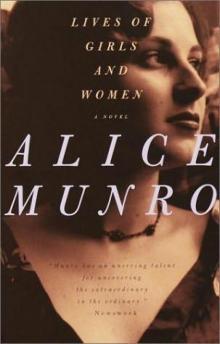 Lives of Girls and Women
Lives of Girls and Women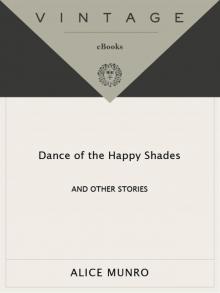 Dance of the Happy Shades
Dance of the Happy Shades Open Secrets
Open Secrets Julieta (Movie Tie-in Edition)
Julieta (Movie Tie-in Edition)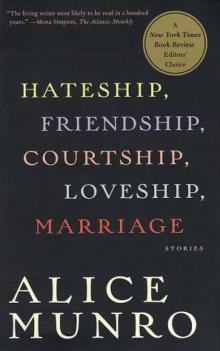 Hateship, Friendship, Courtship, Loveship, Marriage: Stories
Hateship, Friendship, Courtship, Loveship, Marriage: Stories Alice Munro's Best
Alice Munro's Best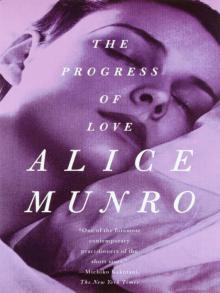 The Progress of Love
The Progress of Love Selected Stories
Selected Stories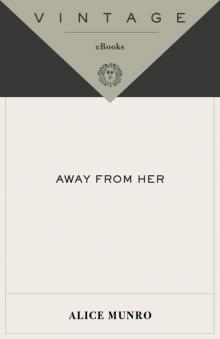 Away from Her
Away from Her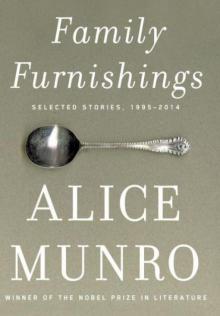 Family Furnishings
Family Furnishings Moons of Jupiter
Moons of Jupiter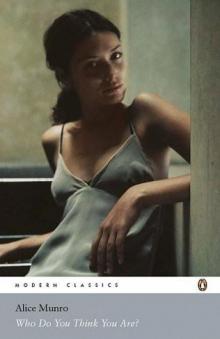 Who Do You Think You Are?
Who Do You Think You Are? Hateship, Friendship, Courtship, Loveship, Marriage
Hateship, Friendship, Courtship, Loveship, Marriage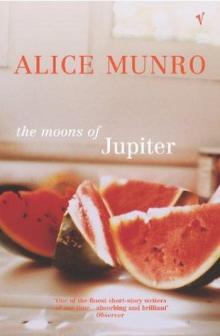 The Moons of Jupiter
The Moons of Jupiter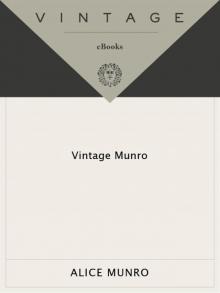 Vintage Munro
Vintage Munro The Love of a Good Woman
The Love of a Good Woman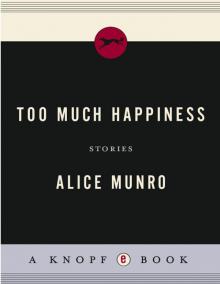 Too Much Happiness
Too Much Happiness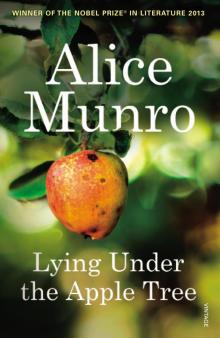 Lying Under the Apple Tree
Lying Under the Apple Tree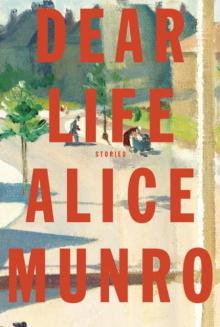 Dear Life
Dear Life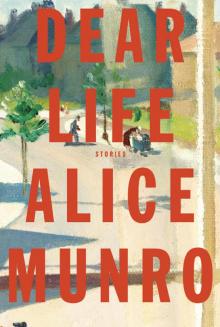 Dear Life: Stories
Dear Life: Stories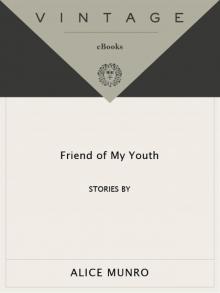 Friend of My Youth
Friend of My Youth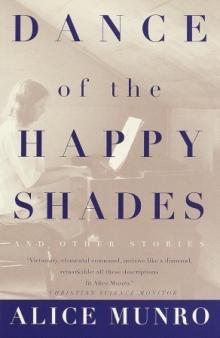 Dance of the Happy Shades: And Other Stories
Dance of the Happy Shades: And Other Stories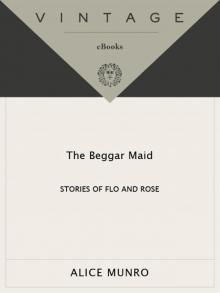 The Beggar Maid
The Beggar Maid